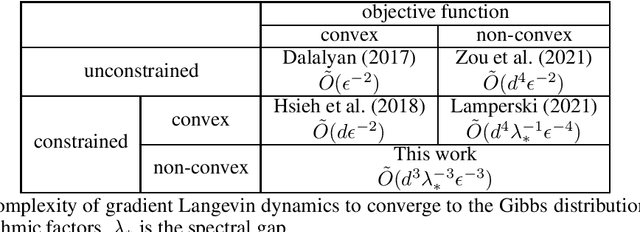Kanji Sato
Convergence Error Analysis of Reflected Gradient Langevin Dynamics for Globally Optimizing Non-Convex Constrained Problems
Mar 19, 2022



Abstract:Non-convex optimization problems have various important applications, whereas many algorithms have been proven only to converge to stationary points. Meanwhile, gradient Langevin dynamics (GLD) and its variants have attracted increasing attention as a framework to provide theoretical convergence guarantees for a global solution in non-convex settings. The studies on GLD initially treated unconstrained convex problems and very recently expanded to convex constrained non-convex problems by Lamperski (2021). In this work, we can deal with non-convex problems with some kind of non-convex feasible region. This work analyzes reflected gradient Langevin dynamics (RGLD), a global optimization algorithm for smoothly constrained problems, including non-convex constrained ones, and derives a convergence rate to a solution with $\epsilon$-sampling error. The convergence rate is faster than the one given by Lamperski (2021) for convex constrained cases. Our proofs exploit the Poisson equation to effectively utilize the reflection for the faster convergence rate.
Dimension-free convergence rates for gradient Langevin dynamics in RKHS
Mar 26, 2020Abstract:Gradient Langevin dynamics (GLD) and stochastic GLD (SGLD) have attracted considerable attention lately, as a way to provide convergence guarantees in a non-convex setting. However, the known rates grow exponentially with the dimension of the space. In this work, we provide a convergence analysis of GLD and SGLD when the optimization space is an infinite dimensional Hilbert space. More precisely, we derive non-asymptotic, dimension-free convergence rates for GLD/SGLD when performing regularized non-convex optimization in a reproducing kernel Hilbert space. Amongst others, the convergence analysis relies on the properties of a stochastic differential equation, its discrete time Galerkin approximation and the geometric ergodicity of the associated Markov chains.
 Add to Chrome
Add to Chrome Add to Firefox
Add to Firefox Add to Edge
Add to Edge